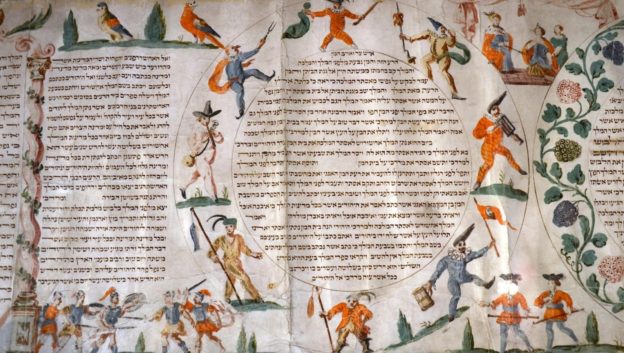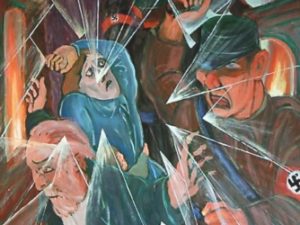One Day…
Category: morality
When you emerge, who will you be?
Behar-Bechukotai
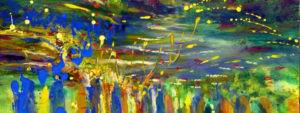
Have you ever taken a vacation?
Usually, it is for one of two reasons:
To see or experience something new, or to Rest and relax (and of course some of us combine these). Both are ways to recharge to have a reset, time away from the normal and challenging tasks of work to engage in shavat v’yinafash, resting and refreshing both the body and the soul.
This week׳s Torah Portion Parsha Behar-Bechukotai talks about a reset- The Shmita -a reset of the land. Every seven years we are supposed to stop tilling the soil to let the fields recharge and all people regardless of stature; resident, worker, and slave alike, even the animals, get to partake equally in what is there.
We let things lie dormant so they can be rejuvenated.
The land is recharged and also not uncoincidentally those who do the hard physical labor of farming are given a respite as well. We do this for seven cycles of seven years and then in the 50th year is the Jubilee. “And you shall sanctify the fiftieth year, and proclaim freedom for slaves throughout the land for all who live on it. It shall be a Jubilee for you, and you shall return each man to his property, and you shall return each man to his family.”(Lev 25:10)
What might we learn from such a giant reset?
Our tradition recognizes that there are imbalances in the system- imbalances inherent in all systems. Some people are more successful in acquiring things, in working skillfully or even artfully, some possess better business acumen, some are particularly adept in choosing the right parents perhaps. And then, there are those not so skilled. The Talmud extensively discusses the issue that “Batar Anya Azla Aniyuta,” or “poverty follows the poor” or that Poverty actually increases from being impoverished.
All societies naturally tend towards these proclivities, and it is up to us, those who can make a difference, to make a change. To reset society to align with our values and principles. Another example of such a reset is commemorated at this time in our calendar.
As we mark the 34th day of our trek to Sinai the story of Shimon Bar Yochai is also worth noting. A disciple of Rabbi Akiva, he and his son, Eleazar, fled to escape the Romans, living in a cave for 12 years. He emerged but instead of re-joining his community, he was disgusted by a perceived lack of piety by the people. Shimon’s eyes burned everything they saw to a cinder, field and man, alike. God’s messenger, The Bat Kol, sent him back to the cave for another year and he emerged an enlightened man dedicated to righteous living and scholarship, redeeming Tiberias and possibly laying the groundwork for writing the seminal book of Jewish Mysticism, the Zohar.
This is the charge of this week’s Parsha- for each of us individually to rededicate ourselves to serving the needs of our people compassionately and deliberately, fully committed to the sacred cause of living Jewishly if we are willing to take up the challenge.
When this health emergency is past, will you emerge hardened from the cave? Or will you emerge from this quarantine open and deeper in touch with the values that are there to guide you? Or, will you figuratively burn what you see to the ground by turning a blind eye towards the deep injustices and needs that exist, or instead, will you choose to engage in pursuing righteousness and Jewish values, treating the people with Tzedek and compassion?
Which path will you choose?
May you choose to walk the Jewish path
Cain Yehi Ratzon,
The Priestly Blessing- A message of hope deliberately placed
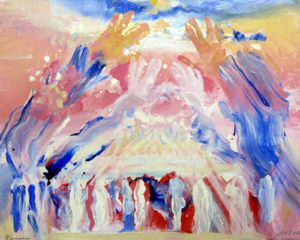
The Priestly Blessing is a message of hope in a troubled world. We have long wondered about the Priestly Blessing being placed in Parshat Naso. Many have posited it was out of place, belonging instead in Leviticus (9:22) when Aaron is told to bless the people. But I believe it is placed here purposefully as a message of assurance, to make sure we understand how important we are to each other and to the Almighty.
Naso contains a census of the Tribe of Gershon, the extraordinary stories of the Sotah, a test for the unfaithful wife, and the issues surrounding the intense vows of becoming a Nazirite. And only then do we read the Priestly Blessing; The three-line expansive blessing upon each of us that God protects us, is kind to us, and grants peace to us. It is actually the perfect response to the perplexing and difficult issues that preceded.
We are told we count. That was central in the previous Parsha, BeMidbar, and reiterated as the census to count the Gershonites. But then we are confronted with the Sotah and the Nazirite, as if to ask are there times when we do not count. We all struggle with life. We seek God’s blessings, we seek meaning, we seek good things, namely peace and a good life. But we find ourselves going off the rails. When this happens are we cut off from God’s blessing?
The Sotah is about accusations of infidelity. But in the absence of anything but circumstantial evidence, the magical test is administered by the Priest. The gravitas of this must be overwhelming. But even if a woman survived the test, would her husband fully welcome her home, without harboring some suspicions. Would trust ever be restored fully? Would others in the community maintain lingering doubts, rumors, and stories placing an indelible stain on the woman’s reputation?
Someone taking the vow of a Nazirite may do it for lofty purpose, but based on our understanding of the things that motivate such action, we see the wisdom of Gersonides’ analysis that, A person takes such a vow to silence the unhealthy turmoil inside a person arising from a physical desire that might lead one to sin. Does the person who needed to take the Nazirite vow feel rejuvenated or reborn when the vow is complete? Does the thing that required such focus continue to linger in their souls? Such impulses can extend beyond lust to other impulses that can plague us emotionally or spiritually.
The Priestly Blessing is deliberately and thoughtfully placed here to say we struggle and we continue to struggle. It comes at us from all angles. It is part of being human in a world that is often fraught and difficult. Each of us has a struggle, a demon, a bad action, a feeling of inadequacy. It is part of who we are as human beings.
The Priestly Blessing is a wish for wholeness, a wish for Peace in an unpeaceful world. The Priestly Blessing is a wish for Peace; it is our yearning that these struggles do not mire us in a life that feels dark or hopeless. It is the profound hope that God is there to love and protect us even when we feel we have strayed so far away that we are beyond the reach of even the Almighty’s loving protective wings of peace.
Hope remains. God is there. We are not alone.
May the Almighty Bless you and Protect you.
May the Almighty deal kindly and graciously with you.
May the Almighty bestow Divine favor upon you, granting you wholeness and peace.
Shabbat Shalom.
Rabbi David Levin is a second career rabbi. Trained at Hebrew Union College-Jewish Institute of Religion, Rabbi Levin’s rabbinate focuses on outreach to seekers of meaning, bringing Jewish Wisdom to their life journey. Rabbi Levin’s work is trans-denominational, embracing and drawing knowledge from all aspects of Judaism. He is a member of the CCAR (Reform Rabbinical Association), OHALA (Renewal Rabbinical Association), NAJC (Neshama, Association of Jewish Chaplains), a Fellow of Rabbis Without Borders, serves on the regional board of NIF (New Israel Fund), and is a volunteer on the Disaster Spiritual Care Team of the American Red Cross.
Rabbi Levin currently teaches The Ethical Will Re-Imagined, as well as Mussar at the Jack M. Barrack Hebrew Academy, Introduction to Judaism for the URJ, “Kavod v’Nichum, Understanding Jewish end-of-life rituals”, and the acclaimed series “L’Chaim, Jewish Wisdom for the End of Life Journey” with two esteemed rabbinic colleagues. Rabbi Levin officiates in complex lifecycle events including non-traditional burial and work with interfaith couples. Rabbi David leads interfaith trips to Israel through the CLAL Stand and See project. Rabbi Levin is the organizer of Death Café of Greater Philadelphia
Blaspheming in the Name of the Sacred- The warning of Parshat Tzav
We have seen the enemy and he is us. So were the immortal words of the great American philosopher Pogo, the satirical cartoon creation of Walt Kelly. That droll quip speaks to a dark sinister reality about what is happening in the Jewish world, in direct contrast to the warning offered by Parshat Tzav.
God directs Moses to command the priests on what to do and how to do it as they fulfill their sacred responsibilities on behalf of the people Israel. It is clear that the sacred tasks require special ways of acting. There is too much at stake; for these are the priest making offerings to God on behalf of God’s people. The priest learn the strict code to which they must adhere. Deviating is not acceptable, and the consequences can be severe, as Nadav and Abihu will learn.
Later on, we learn that the nation itself is a nation of priests. That we as a nation are similarly charged with a series of behaviors that are required of us to fulfill our responsibilities. These laws are put forward in Torah and then developed by the rabbis and shared in the Oral Torah and the great works that expound upon these laws. Like our priestly class, the nation of Israel is bound to the laws of Torah on how to act in order to fulfil our sacred responsibilities of being a light to the nations.
That light has been dimming as a result of a move away from our role as faithful servants to something that embodies a hubris endangering and attacking our core values as a people. We have moved from the sacred work of Sanctifying God’s name to profaning God’s name, from Kiddush ha-Shem to Hillul ha-Shem.
At the most recent Rosh Chodesh at the Kotel we witnessed a brutal and tragic display of violence against the Women of the Wall. We do not agree on how we should engage in ritual. I respect other approaches to Judaism, even though I do not practice them. Likewise, there are many who would see my religious practice as unacceptable. However deep the disagreements may be, there is no justification for the violence perpetrated on the Women at the Kotel. I would argue that the shouting is an undermining of the special space that is the Kotel and place. But physical battery is blasphemy, plain and simple. It curses God’s name and everything that Judaism is supposed to represent. In the name of the sacred, everything sacred has been trashed, God’s great name was trampled in the mud. The violent encounter was in violation of all of Jewish Law and culture. This moment is a tipping point for us as a people. And this is not the only arena where our behavior needs to be critically examined. Tzav, commanded behaviors, require adherence to standards of decency and ethics. Are we acting as God has directed?
There is a rise in racism in Israel is an insidious cancer eating away at the very soul of the State. This racism dehumanizes the non-Jew, whether they be citizens of Israel or Palestinians of the West Bank and Gaza. The inability to see the other as one with fundament human and civil rights, entitled to dignity and respect, undermines the ideals of both the Jewish State and the Jewish religion.
The violent racist Kahanists, Otzmah Yehudit, have a new-found acceptance in Israeli politics. The inclusion of these group dedicated to an extreme racist view, enforced by thuggery, should be unthinkable, but instead of repudiating them and everything they stand for, they are legitimized and welcomed. There are appeals to the courts seeking redress, but ultimately the Israeli people must speak out unequivocally against this base and baseless hatred.
This issue also confronts American Jewry. As anti-Semitism is on the rise, American Jews must respond. The manner in which we move forward will determine if we are no better than those who hate us. Can we be strong and resolute without resorting to similar tactics as those whose ideas we find dangerous and contemptible? Can we find sufficient security in this extraordinary place and time in our history to battle anti-Semitism and not feel disenfranchised by those contemptible people on the margins of society who seek to do us harm?
The second temple was destroyed, our sages say, due to Sinat Chinam, the baseless internecine warfare that existed within the Jewish people. Instead of a tolerant society with many different interpretations of Judaism, the People of Israel became a fractious group of competing sects intent on imposing their particular view on everyone, ultimately sacrificing everything. Can we reclaim the ideals of Klal Yisrael, or is history repeating itself?
Our leaders from across the breadth of our tradition including Rabbi Nachman the Hasidic master, Rav Kook the founder of religious Zionism, and Rabbi Abraham Heschel an American Prophetic voice, to name only three, all warned against hatred against others, no matter how deeply offensive we might find certain practices. They encouraged us to embrace the best of our tradition so that we may bring forward our values in the world. Tzav as part of the book of Leviticus, as part of Torah, lays out the rules for how to act as a people in sacred service to God. These rules are based on core values that are central to every expression of Judaism, religious, ethnic, and cultural. When we violate the values that are at our core, we betray the sacred aspirations of our tradition. Tzav reminds us of our duties and sacred obligations and admonishes us not to stray. Tzav demands more of us, we need to take heed and act better.
The somber and painful message of Adult Purim
A person should drink on Purim until the point where he can’t tell the difference between “Blessed is Mordechai” and “Cursed is Haman. (Talmud – Megillah 7b) “Ad d’lo yada…”
Why do we drink so that we can no longer distinguish between the “Blessed” Mordechai and the “Cursed” Haman? Perhaps because in this world of Purim where things are turned upside down, the two men had changed places and toward the end of this story, it is impossible to distinguish between them. And this serves as a warning for us to take great care in how we act. The rabbis are admonishing us that underneath this story of triumph and joy lies an ominous message.
Towards the end of the Megillah, the story takes a dark turn. Briefly, the Jews are saved, Haman is hanged. The King grants the Jews permission to annihilate anyone that poses a threat to them, including women and children and to plunder their possessions. Mordechai methodically plans the Jew’s revenge; and the oppressor becomes the victim as the Jews dominate their enemies. First in Shushan, the Jews killed 500 men and Haman’s 10 sons, then another 300 were killed, and then across the kingdom the Jews proceeded to kill seventy-five thousand more. The death and destruction recounted is dreadful. Jews slaughtering in retribution are as horrible as those actions Haman had planned. Mordechai accomplishes what Haman had plotted.
We are admonished to destroy the Amalekite, and Haman is a descendant of Amalek himself. But if we annihilate the enemy, even one who planned to annihilate us, aren’t we just as guilty of murder and bloodshed? It is not only the Amalek who lives as another that should concern us; A piece of Amalek lives inside all of us, call it the yetzer hara, or inclination toward evil. Our yetzer tov, or inclination toward good, is always in competition with it. Purim asks which of these will prevail in our lives? At its core, the destruction of Amalek and the story of Purim are existential questions of our humanity.
And perhaps that is why we drink to oblivion. Usually, we drink wine as a symbol of our joy. But drinking to excess is something else entirely. Heavy drinking is a form of self-medicating. Drinking until losing rational senses is drinking to forget. We drink heavily to escape the brutal reality. Although our people were saved, we committed atrocities- not as a crime of passion, but a deliberate plot to methodically exterminate tens of thousands of people. We drink to forget our shame and horror at what we had done.
To underscore this grave situation, the Gemara on Megillah 7b continues with the bizarre story of Rabba and Rabbi Zeira, where in a drunken stupor, Rabba slaughtered his dear friend Rabbi Zeira. Otherwise good people can do profoundly terrible things. This is what can happen when you lose control, when you lose sight of what is right, betray your core and operate in the absence of God (it is noteworthy that Megillat Esther does not mention God). And it is precisely here that the rabbis insert God back into the discussion as Zeira is resurrected after Rabba beseeches God to intervene and set right what Rabba had destroyed.
When we arise from our stupor, we have a hangover; a brutal headache from the excesses of the night before. We know that a hangover is an indication of dehydration, a lack of water , which further intensifies the message. Water is a metaphor for Torah, and maybe it is the lack of Torah that permitted the carnage.
Megillah Esther warns us to be very careful. The Megillah cautions us to not become “like them” and react to extract revenge, sacrificing both them and our humanity. Megillat Esther challenges us instead to rise up with dignity and respect, embracing the values that have made Judaism the extraordinary gift to the world that it is.
Purim is a layered complicated story filled with cause for celebration and sorrow and an profound admonitory note to soberly review who we are.
A special message for Shabbat: Remembering Kristallnacht and Veteran’s Day
This weekend is an extraordinary confluence of memories and events that I pray leads to our rededication to the values we cherish as a nation and as Jews. Kristallnacht and Veteran’s Day are times of extraordinary solemn remembrance. The lessons we learn from these can shape our commitment to the world we seek to achieve.
November 9 marks the anniversary of Kristallnacht, Nazi Germany’s great pogrom and genocide against the Jewish people. The oppression and persecution of the Jews of Europe entered a new and deadlier phase bringing the long-simmering anger and aggression out into the open as Goebbels encouraged mass arrests, violence against Jews and any visible signs of Jewishness, including synagogues, stores, and our sacred texts.

November 11 marks Veteran’s Day, the time we honor those who have bravely fought to preserve, protect, and defend our country and the values we represent. Eventually, these men and women fought against the Nazi’s tyrannical regime built on hate but sadly too late to rescue the 6 million Jews slaughtered.
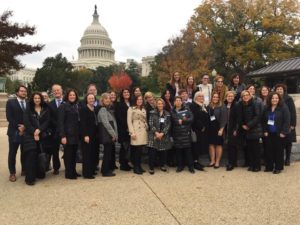 And yesterday, November 9, I was proud to accompany the Women’s Philanthropy Division of the Jewish Federation of Greater Philadelphia on a trip to Washington, DC to advocate both in Congress and the White House for DACA, Responsible Gun Legislation, Food Insecurity and the SNAP program, and against BDS and Anti-Semitism. We championed our values and spoke truth to power with persuasive force and civility.
And yesterday, November 9, I was proud to accompany the Women’s Philanthropy Division of the Jewish Federation of Greater Philadelphia on a trip to Washington, DC to advocate both in Congress and the White House for DACA, Responsible Gun Legislation, Food Insecurity and the SNAP program, and against BDS and Anti-Semitism. We championed our values and spoke truth to power with persuasive force and civility.
The struggle to realize a better kinder nation and world continues. Yasher Koach and most profound gratitude to all of those who join the fight.
Shabbat Shalom.
If not now? A call for change on Yom Kippur
#4 What do we do now- Be Kind
We come to the Third part of Hillel’s quote: If not now, When? The answer is NOW.
I have refrained from speaking directly about Charlottesville with you thus far.
I am sure that the public display of hate deeply pained you.
The horrible chants, torch-lit marching, gun-toting thugs,
40 Jews inside Congregation Beth Israel that evening,
spiriting their Torahs out the back door, expecting the Temple to be burned, it sickens me.
The Nazi march was vile and despicable behavior by people who live on the fringes of our society,
a group that trucks in hatred,
truly disenfranchised miscreants who crawled out from the dark underbelly of this great nation
and are mired in their own bizarre fantasies of violence and white supremacy.
I am very angry and deeply saddened by this horrific display.
And I am equally appalled by the lack of moral leadership on this and all issues at the highest levels in our land.
However, I am not fearful.
And in response to the horrors of Charlottesville
I have a one-word reply:
Houston.
Charlottesville and many other places make it clear we have a long way to go in the battle for life, liberty, and equal justice for all.
Again I say Houston. For there in Houston, there is hope.
In response to the devastating Hurricane Harvey that dumped floodwaters of biblical proportions on the region,
the very best of humanity showed up to the rescue.
There were only two groups in the city:
The rescuers and those in need of rescue.
Race, religion, color, creed, age, sex, gender identification, political affiliation, economic class, social class-
Nothing mattered except the need to save lives of people.
The Cajun Navy spontaneously appeared, people helped people, human chains literally reaching out into the floodwaters,
holding tight to each other
so that another life could be saved from the torrents of water. Everyone was on both ends of that lifeline.
In losing everything, the people of Houston found something truly precious, their humanity.
My response to the horror of Charlottesville is the beauty of Houston.
We seem to be at our best in the aftermath of a calamity.
Houston, Sandyhook, 9/11- these are only a few catastrophes to which we have risen up as a people,
United in bonds of love and fellowship.
Why must we reserve our best in response to tragedy?
This Yom Kippur, I suggest we preemptively deploy our best behavior in our everyday lives.
Let us shine light into the darkness
and illumine a path that leads out of the narrow places,
the Mitzrayim- the Egypt- those spaces both literal and figurative that both confine and oppress us.
Let us join together doing acts of loving-kindness.
Let us not sit helplessly and lament the world we long for.
Let us reach out to one another and build the world that should be. Let the humanity of Houston be our inspiration.
Together let us march forward
carrying love in our hearts and good deeds in our arms.
We have come to the proverbial edge of the Red Sea,
yet one more time in our history. Let us cross over together.
(And if I sound a bit like a Southern Baptist preacher, I can only say, Thanks, Grandma.)
How do we do this?
For you may say, I am only a single individual-
what effect can I possibly have?
I recall the story told of Mother Theresa,
that saint who tended the poorest of the poor in India.
A cynic asked her how she intended to feed the overwhelming masses who were hungry- she responded simply,
One Mouth at a Time.
And that is how we do it.
Each of us has the power to effect change.
The V’ahavta prayer says VeLo Taturu.
Never underestimate the power to make a difference- each of us.
It is about meeting people, one person at a time.
It is about individuals building relationships with one another
and building these connections into bigger connections,
building a community with shared values and purpose.
And it all starts with one simple idea: You.
Rabbi Hillel says in Pirkei Avot,
“In a place where there are no men, strive to be a man.”
As Jeffrey Goldberg of the Atlantic insightfully translates,
it means to be a mature, courageous human being;
it also means to be a mensch. So I sum it up and say simply to you: Be Kind.
In an age and culture where we have become coarse and combative,
BE KIND.
In a world filled with overwhelming loneliness and alienation,
BE KIND.
In a world quick to cynically chastise and separate with fractiousness and divisiveness,
BE KIND.
Hillel condensed all Torah to this:
“What is hateful to you, do not do to another.”
BE KIND. This as our call to action.
Start with yourself.
Let us free ourselves from the shackles of guilt and sin keeping us mired in the past.
Learn from it to live next year better.
Be kind and forgiving of your self. Starting now.
Promise yourself to engage.
Jews are taught to awake with the words “I am Thankful.”
“Modeh Ani Lifanecha, Elohai Nishama Shenatati bi tihora hi.” ‘Thank you God for restoring my pure soul.”
What a beautiful intention to start the day.
A fresh slate, built on gratitude for our blessings
and hopeful for the possibilities that await us.
Use the day to engage in the things that motivate you- your Why. Actively support something you believe in,
a philanthropy or a cause,
be part of something greater than yourself.
End your day with a bedtime Shema- prayer.
Go to sleep knowing
you are in the sheltering arms of the One who loves and protects you.
Nurture your relationships.
Be compassionate and forgiving; for they too are as flawed, seeking wholeness and love.
BE KIND.
Find your community and
BE KIND.
We need a caring community to support and comfort us
During times of celebration and sorrow.
Temple Micah is an extraordinary community to find people with shared values.
And together we can make a difference
rising up our voices as one,
speaking with more power than one alone to affect greater change. Give to the food bank,
give to help the suffering victims on Puerto Rico.
BE KIND.
Our greater communities, both our nation and the world,
need people to champion our values now more than ever.
Your voice, your time and your money are all necessary
to champion the things you believe in.
There is no shortage of need, and we cannot be silent.
“Kol Arevim Zeh BaZeh.”
All Israel is responsible for each other.
Whether you see Israel literally or metaphorically,
you can make a difference in
the genocide of the Rohingya, happening as we speak,
climate change, Israel, healthcare, the political debate both national and local.
These issues are our issues.
Find the one that resonates with your and pursue it.
We need to build a better world.
I believe it can happen.
But only if we are willing to roll up our sleeves and do the work necessary,
for it cannot happen on its own.
As it says in Psalm 89 verses 3,
Olam Chesed Yibaneh. “We will build this world with love.”
Jewish Love is not romantic love.
We learn Jewish love in the Shema and V’ahavta prayer.
Love is an active verb.
Jewish love is not a state of being, it is a state of doing.
The prayer instructs us to Love God by living the commandments, teaching them to our children
and fully embracing them in all of our thoughts and actions.
Jewish wisdom sees the Heart as the guide to emotion and action. I am the change I want to see.
This is the empowering message of the Torah.
It implores us to embrace that
only through our own action will we begin to build the world that should be.
The people of our nation have always had to fight for the values we hold dear;
from the moment we first expressed them through the present day. This amazing country of ours is both resilient and great.
But we remain a work in progress with a long way to go before all of her children will enjoy the aspirations of our foundational documents, including the Declaration of Independence, the Bill of Rights and Emma Lazarus’s poem on the Statue of Liberty.
Life, liberty, and equal justice for all remain the promise we still strive to achieve.
This promise is the beacon of light shining from on top of the hill to the other nations of the world.
We will build this nation on love.
Olam Chesed Yibaneh. We will build this world on love.
As we move toward the end of our prayers today
we will hear that the gates are closing and also
that the gates of repentance are never closed.
These two seemingly contradicting ideas both live in our texts.
I believe that with Ne’ilah, our closing prayers,
the liturgists are exhorting us to act.
It is the urgency of now. We cannot wait.
The prophetic tradition that is ours,
The fragility of life that makes each day a gift-
they combine to say “don’t wait another minute.”
So here is this sacred space, as we conclude our services this day,
I encourage everyone here to smile at one another,
kiss and embrace your loved ones,
and kiss and embrace whoever is near you.
This is the start of something new.
We will build this world with love.
G’mar Tov- May you be sealed for Good
Olam Chesed Yibaneh (sing)
Come Together- The AIPAC Dilemma
Trump has spouted words that are divisive, angry, bigoted and hateful. These things are anathemas to Jewish sensibilities. Many Jews and Jewish organizations, the CCAR and the URJ among them, have denounced such hate speech. But we are about to hear the speaker in an appearance before AIPAC. This dilemma is of AIPAC’s own creation.
AIPAC has created a large and powerful voting group of Jews coalescing around promoting its view of American support of Israel. Obeisance to AIPAC’s understanding of the American-Israeli alliance is the litmus test that will judge the suitability of the presidential candidates. So expect nothing more.
The candidates should not rise or fall based on a single speech. But given the stakes, I expect all candidates to speak in support of a strong secure Israel. I do not expect thoughtful analysis of the Middle East or a path towards peace, just words espousing that peace is good, Israel must remain strong and we are Israel’s friend. I do not recall a candidate speaking otherwise to any Jewish groups or lobby. To expect more than these platitudes, however, would be to set unrealistic expectations. Even if both candidates did have detailed plans, given the deep fissures in the American Jewish community and our own inability to engage ourselves in meaningful dialogue, anyone with political savvy will play to the crowd rather that risk alienating a voting bloc.
I will not judge a candidate’s suitability for President based on this opportunity to curry favor with AIPAC, nor should anyone attending the AIPAC conference. Mrs. Clinton was one of the earliest national leaders to speak to the idea of a two-state solution, which was most unorthodox at the time and did not sit well with many. Mr. Trump has not-too-deftly tried to balance his need to be an impartial mediator with pro-Jewish, pro-Israel sentiments. We must look to a record of thoughts and deeds to establish the bona fides of the candidates. We need to have someone who understands the complexities of the situation.
The AIPAC convention is not the place where this will happen. So this phase of the conference is merely a beauty pageant. AIPAC can bask in its own glory, pleased in knowing it had the political clout to force the equivalent of a bathing suit competition. But we will learn precious little more than that. This is a moment to reassess our true motivations for having such appearances and why we attend such staged events.
Many friends and colleagues are heading to the convention to learn and show support for AIPAC and its work supporting Israel. I commend my colleagues and friends who are grappling with the appropriate response to Mr. Trump. I suggest that whatever course of action you decide, it is unfortunate that the AIPAC convention has become so focused on something so meaningless.
The Real Tragedy of Palmyra’s Destruction
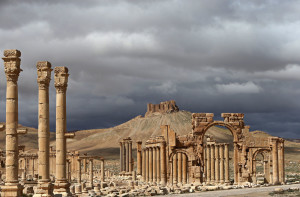 All of us are sickened by the horrible barbaric acts of ISIS and rightly so. Their vision incorporates an intolerant hateful extreme interpretation of Islam, destroying and creating terror wherever they are, in the name of a new triumphant Caliphate.
All of us are sickened by the horrible barbaric acts of ISIS and rightly so. Their vision incorporates an intolerant hateful extreme interpretation of Islam, destroying and creating terror wherever they are, in the name of a new triumphant Caliphate.
We have watched helplessly while ISIS destroys Palmyra, an extraordinary archeological remnant. I find this somehow ironic; for Palmyra is nothing more than remnants. The remains of Palmyra are ruins precisely because of a history where the next invader destroyed what preceded. So ISIS continues to do what has done for millennia.
I certainly do not suggest that ISIS is either civilized or legitimate, anything but. However, human beings have a past where we often find a need to conquer and destroy rather than honor and build upon what came before. These ancient ruins are sites of destruction and murder from history. They are tied to cycles of building and prosperity punctuated by war, overthrow and occupation. Possibly there is more we can learn in this moment beyond how to preserve ancient monuments.
Perhaps if we are to truly honor Palmyra, saving the inhabitants of the land should be the priority. ISIS is partly a reaction to a failed nation-state, which we, the “civilized” West, had supported. The developed countries helped to create a festering problem by permitting strongmen to ruthlessly rule because it was in our political interests to do so, rather than create an organic sustainable government whose legitimacy is derived from the people governed. ISIS is attempting to fill a void created when the dictatorship is finally overthrown and there are no institutions or even a history of governance to take its place.
The “civilized” world must accept its responsibility in creating the situation that now exists and therefore engage in nation building to create a place where the native people can live in peace. In the interim, it is our responsibility to provide safe haven for the refugees and victims of war by providing shelter, food and clothing through temporary facilities as well as through immigration. Only when the civilized world does these things can we say we truly honor our past and that humanity is indeed progressing forward.
Pushback on Israel’s obligation to Syrian Refugees
I have received pushback on my call for Israel to join the humanitarian efforts and take in refugees. I share my response below, to a comment to a post from someone who does not believe as I do. But let me state for the record that this person, with whom I disagree on this and many other subjects regarding Israel, is someone who I know loves Israel very deeply. And it is her love for Israel that compels her to take her stand and be in dialogue with me. I am honored that she thinks enough of me to want to engage in this conversation. Please look to the sidebar to see her comments.
Israel’s moral compass should continue to lead it to be a champion of human values and decency. It is compelled to act as a “light to the nations.” In other words, to be a Jewish homeland is to embrace Jewish Values.
I understand your fear for Israel’s safety. But Israel has the finest security and intelligence capabilities in the world, from the Mossad to the people at the airport. I am fully confident that the Israelis can vet refugees.
And another place where we agree, implementing is not easy. No one realistically would claim otherwise. But I find President Kennedy’s words stirring,
“We do these things not because they are easy, but because they are hard… because that goal will serve to organize and measure the best of our energies and skills.” We do it because we are Jews and that is what Jews do to live the values we cherish.
May we all be inscribed in the Book of Life, L’Shana Tova Tikatevu
Shabbat Shalom

